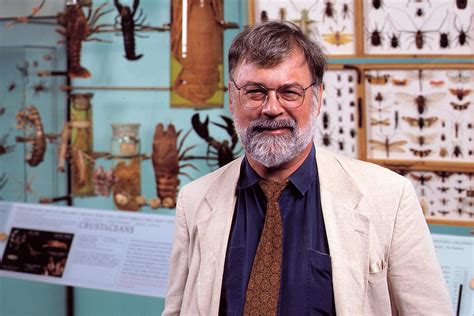A Quote by David M. Raup
We now have a quarter of a million fossil species, but the situation hasn't changed much... We have even fewer examples of evolutionary transition than we had in Darwin's time.
Related Quotes
Paleontologists ever since Darwin have been searching (largely in vain) for the sequences of insensibly graded series of fossils that would stand as examples of the sort of wholesale transformation of species that Darwin envisioned as the natural product of the evolutionary process. Few saw any reason to demur - though it is a startling fact that ...most species remain recognizably themselves, virtually unchanged throughout their occurrence in geological sediments of various ages.
Paleontologists had long been aware of a seeming contradiction between Darwin's postulate of gradualism, confirmed by the work of population genetics, and the actual findings of paleontology. Following phyletic lines through time seemed to reveal only minimal gradual changes but no clear evidence for any change of a species into a different genus or for the gradual origin of an evolutionary novelty. Anything truly novel always seemed to appear quite abruptly in the fossil record.
If it is true that an influx of doubt and uncertainty actually marks periods of healthy growth in a science, then evolutionary biology is flourishing today as it seldom has flourished in the past. For biologists collectively are less agreed upon the details of evolutionary mechanics than they were a scant decade ago. Superficially, it seems as if we know less about evolution than we did in 1959, the centennial year of Darwin's on the Origin of Species.
There are about 250,000 different species of fossil plants and animals known . . In spite of this large quantity of information, it is but a tiny fraction of the diversity that [according to the theory] actually lived in the past. There are well over a million species living today and . . [it is] possible to predict how many species ought to be in our fossil record. That number is at least 100 times the number we have found.
A Chinese paleontologist lectures around the world saying that recent fossil finds in his country are inconsistent with the Darwinian theory of evolution. His reason: The major animal groups appear abruptly in the rocks over a relatively short time, rather than evolving gradually from a common ancestor as Darwin's theory predicts. When this conclusion upsets American scientists, he wryly comments: "In China we can criticize Darwin but not the government. In America you can criticize the government but not Darwin."
When Cuba lost their fossil fuel pipeline when the Soviet Union collapsed in 1990. Overnight they had no choice, they had to transition to clean energy, they didn't have any fuel to burn, and they also had to transition to a healthy food system, an organic system - their economy is crashing, this was not a planned transition. This was a crisis, but a crisis nonetheless, in which pollution went away. And it's very instructive to see what happened to their health.
Most people are surprised when they hear my somber figures: we know of 2 million species of plants, animals and microorganisms, and we can give them each a scientific name and a diagnostic description. We know, perhaps generously, more than just a little bit of the anatomy in no more than 10 percent. We have done thorough studies in fewer than one-tenth of 1 percent. And the total number of species on Earth is unknown to the nearest order of magnitude.
Darwin's theory of evolution is a framework by which we understand the diversity of life on Earth. But there is no equation sitting there in Darwin's 'Origin of Species' that you apply and say, 'What is this species going to look like in 100 years or 1,000 years?' Biology isn't there yet with that kind of predictive precision.































